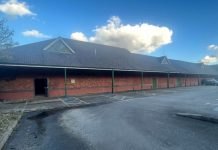The East Midlands commercial property market will see a sluggish recovery in 2014 but has a long way to go to catch up with the performance of rural land in the last four years, a leading property specialist says.
Andrew Granger & Co saw increasing numbers of commercial property transactions towards the end of 2013, and in the first weeks of the new year, but reports that prices remain flat. By contrast, its rural team have seen land prices quadruple since 1991.
Andrew Robinson, one of the firm’s specialist partners in commercial agency and property management, says there is demand from businesses wanting to buy their own premises but little likelihood of a surge at the top end of the market with the supply of premium office space exceeding demand across the region. Retail has particular problems while demand for rural offices is tightly linked to the availability of broadband internet connections.
Tenants for Grade A office buildings may be hard to find, but he says more modest properties that are reasonably priced are likely to find buyers because of the region’s large pool of prospective owner-occupiers: “Perhaps because we have a greater proportion of small and medium size businesses in the East Midlands, there is always demand from businesses wanting to buy premises, even though the returns are not fantastic. There is a lot of money around that companies have been hoarding rather than investing during the downturn, and property is always seen as a safe place to invest. Yield isn’t everything.”
He adds: “We see a slight improvement in the East Midlands office market in terms of the number of transactions but as yet there are no price increases. Nottingham’s market continues to be different from Leicester with tenants looking for bigger premises, and the market in Derby is improving too.
“We’re very unlikely to see much major office development in the near future. There is very little incentive for developers with the true rental level no higher than £15, even if headline figures suggest £16.50. We think there is certainly enough existing and planned Grade A space in Leicester, Nottingham and Derby, and there is a lot of availability in Northamptonshire. There is a chicken and egg situation. Does the fact that there isn’t a great deal to choose from deter people, or is the space not there because of lack of demand?”
On retail property, he says: “We saw a mini bubble in retail premises 12 months ago but demand is confined to provincial towns as city centres have yet to adapt. There is a dynamic change that means catering for people who still want to go to shop means being very service based, providing premium end goods that you can’t buy on the web, and creating a coffee culture.”
On rural offices, he says: “The key to success is now very dependent on broadband. In one Leicestershire village, there was zero interest from businesses in some offices to rent until broadband became available. Then they were snapped up.”
The company has a commercial portfolio of £19 million and manages £12 million of development land with 50 partners and staff, including nine surveyors.























